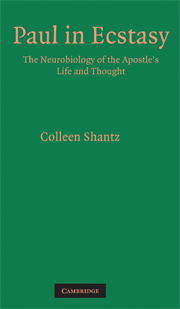Book contents
- Frontmatter
- Contents
- Acknowledgments
- Dedication
- Introduction
- 1 What Ecstasy? An Assessment of the Misregard
- 2 Paul's Brain: The Cognitive Neurology of Ecstasy
- 3 Paul's Voice: Parsing Paul's Ecstatic Discourse
- 4 Paul's Practice: Discerning Ecstasies in Practice
- 5 The Whole Paul: A Short Course in (Nondeterministic) Complexity
- Bibliography
- Index of Ancient Sources
- Index of Modern Authors
- Subject Index
2 - Paul's Brain: The Cognitive Neurology of Ecstasy
Published online by Cambridge University Press: 06 January 2010
- Frontmatter
- Contents
- Acknowledgments
- Dedication
- Introduction
- 1 What Ecstasy? An Assessment of the Misregard
- 2 Paul's Brain: The Cognitive Neurology of Ecstasy
- 3 Paul's Voice: Parsing Paul's Ecstatic Discourse
- 4 Paul's Practice: Discerning Ecstasies in Practice
- 5 The Whole Paul: A Short Course in (Nondeterministic) Complexity
- Bibliography
- Index of Ancient Sources
- Index of Modern Authors
- Subject Index
Summary
God guard me from those thoughts men think in the mind alone.
– W. B. YeatsWhen the Canadian psychologist Dr. Michael Persinger got hold of a similar device a few years ago, he chose instead to stimulate parts of his temporal lobes. And he found to his amazement that he experienced God for the first time in his life.
– V. S. RamachandranGiven the difficulties with representative treatments of Paul's ecstatic religious experience, a fresh assessment seems warranted. In this chapter, I will consider Paul's ecstatic religious experience as a thing in itself, and in particular as an experience of an ASC. This approach commends itself for a number of reasons. First of all, it seems prudent to begin with the assumption that Paul's ecstatic religious experience shares some of the character of the religious ecstasy of others; although his experience may well be distinctive, it is fallacious to begin by assuming that it is unique. So, if Paul did not “journey” to heaven and speak in tongues in an altered state of consciousness, he would be unique, at least among those whose testimonies are accessible to critical scrutiny. Second, this approach offers an exploratory perspective through which experience can be described as more than second-order reflection and conscious thought. Finally, and relatedly, it takes seriously the fact that Paul was a contributing participant in his own experience, not merely in later reflection on it.
- Type
- Chapter
- Information
- Paul in EcstasyThe Neurobiology of the Apostle's Life and Thought, pp. 67 - 109Publisher: Cambridge University PressPrint publication year: 2009



